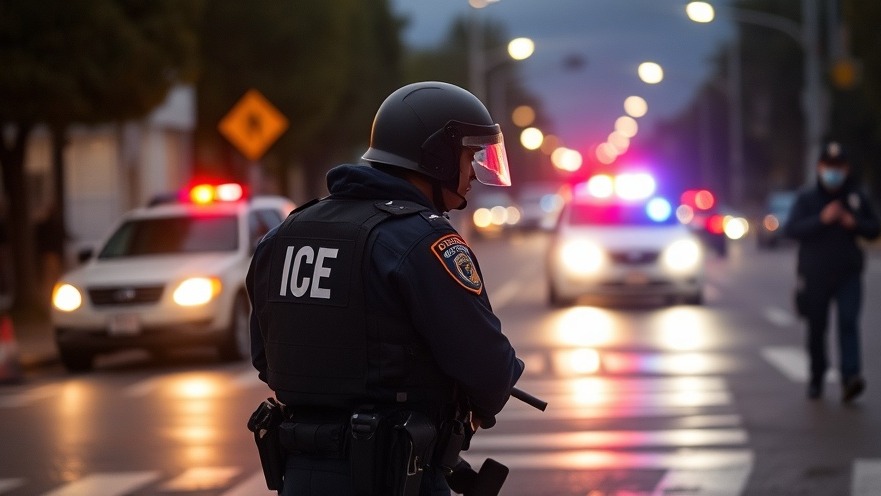
A Tragic Incident in Denton: A Closer Look at the Shooting
On Saturday, authorities in Denton, Texas, were called to the scene of a disturbing shooting that claimed the life of a man experiencing homelessness. The shooting occurred in the heart of the Downtown Square, a location known for its vibrant community and bustling activity.
The event unfolded around 12:10 p.m. when police received multiple 911 calls regarding gunfire in the 200 block of W. Hickory Street. In a preliminary assessment, the Denton Police Department indicated that a disturbance had erupted between the shooter, a male patron, and the victim prior to the shooting.
Public Information Liaison Amy Cunningham confirmed that as of Saturday night, no charges had been filed against the shooter, who remained on the scene and is cooperating with detectives. Witnesses reported a chaotic atmosphere as onlookers ducked for cover in nearby establishments when the shots rang out, illustrating the terrifying impact of the violence. One store employee recounted hearing four shots, while another witnessed the aftermath of the shooting as they called 911 for help.
Understanding the Broader Issues: Gun Violence and Community Safety
This tragic event raises crucial questions about public safety and gun violence, issues that resonate throughout Dallas and the surrounding communities. As cities across the United States grapple with rising gun violence, incidents like this one in Denton underscore the urgent need for dialogue around community safety, gun control measures, and support services for vulnerable populations, such as the homeless.
The reported disturbance prior to the shooting highlights a broader trend in violent encounters, often exacerbated by underlying societal issues. Many cities, including Dallas, have been actively discussing the intersections of crime, homelessness, and public safety, aiming to reduce confrontational situations that can lead to tragic outcomes.
Reactions from Local Community Members
Community reaction has varied, reflecting a blend of shock and concern. Local residents have expressed their fears of increasing violence in a place they consider home. The emotional impact on those who witnessed the event cannot be understated, as workers near the scene reflect on their feelings of vulnerability and trauma.
One eyewitness, Gail Perez, candidly shared her experience of the event, telling reporters how it has left her feeling jumpy and anxious. Such personal stories serve as a reminder that the repercussions of violence extend beyond the immediate victims and touch upon the collective psyche of the community.
Future Implications: Community Engagement and Policy Responses
The Denton shooting has once again cast a spotlight on local authorities, urging them to reconsider policies regarding public safety and outreach programs tailored to help the homeless. Advocacy for improvements in mental health services, job training, and affordable housing could be part of a more comprehensive strategy to alleviate crime and improve community relations.
With upcoming city council meetings and discussions set to highlight public safety and homelessness, residents are encouraged to engage in the political process, voice their concerns, and advocate for better resource allocation. Local leaders in Texas are likely to revisit these critical topics as community sentiment calls for urgent action.
A Call to Reflect on Social Dynamics and Support Systems
This tragic incident serves as a profound reminder of the societal issues facing many American communities. As we process this shooting, it is essential to consider how each of us can contribute to a more compassionate society.
Community organizations, outreach programs, and local government must come together to address the root causes of violence and homelessness. Initiatives that foster understanding and compassion can help bridge gaps between different community groups, ultimately creating a safer and more inclusive environment.
What Can Be Done: Taking Action Against Violence
As residents of Texas and beyond reflect on the implications of this event, there lies a call to action for increased advocacy around community safety, mental health resources, and support networks. Getting involved with local nonprofits, attending city council meetings, or supporting initiatives aimed at improving public welfare can help make a difference.
Violence can be diminished when communities come together with a shared purpose. It’s time to step up, engage in meaningful conversations, and work collectively towards a future where such tragic incidents become a rarity.
As we conclude our coverage, the need for action is clear. We urge readers to remain engaged, participate in local discussions, and actively advocate for changes that promote safety and support for all members of society.
 Add Element
Add Element  Add Row
Add Row 



Write A Comment